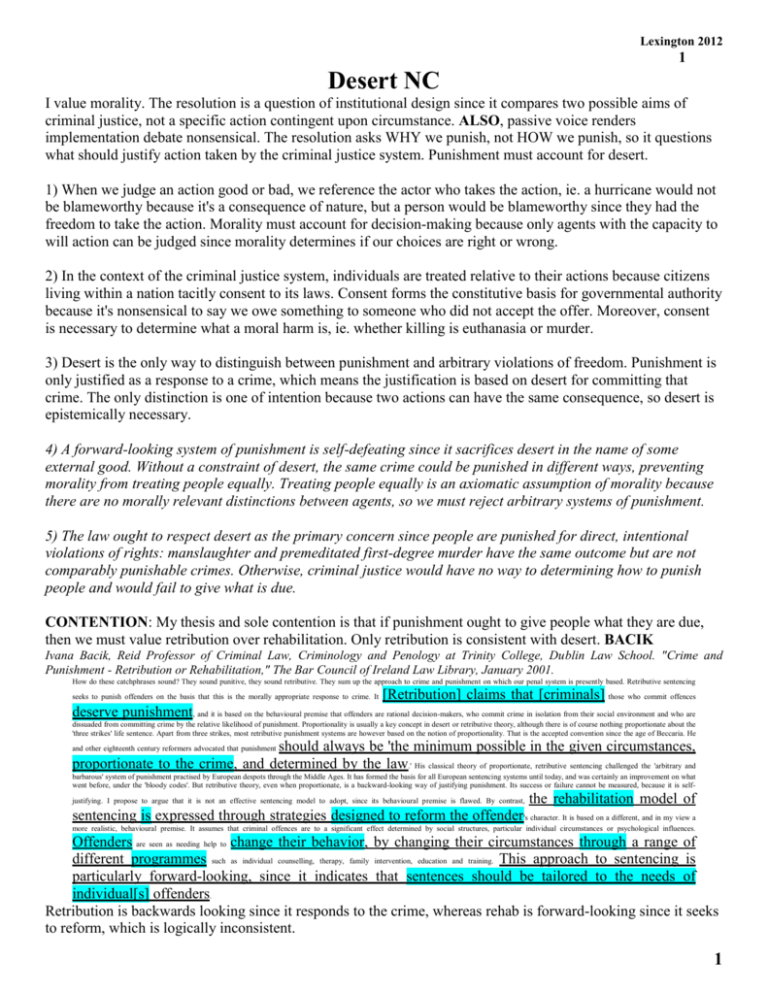Alt + A – Debate Underline
advertisement

Lexington 2012 1 Desert NC I value morality. The resolution is a question of institutional design since it compares two possible aims of criminal justice, not a specific action contingent upon circumstance. ALSO, passive voice renders implementation debate nonsensical. The resolution asks WHY we punish, not HOW we punish, so it questions what should justify action taken by the criminal justice system. Punishment must account for desert. 1) When we judge an action good or bad, we reference the actor who takes the action, ie. a hurricane would not be blameworthy because it's a consequence of nature, but a person would be blameworthy since they had the freedom to take the action. Morality must account for decision-making because only agents with the capacity to will action can be judged since morality determines if our choices are right or wrong. 2) In the context of the criminal justice system, individuals are treated relative to their actions because citizens living within a nation tacitly consent to its laws. Consent forms the constitutive basis for governmental authority because it's nonsensical to say we owe something to someone who did not accept the offer. Moreover, consent is necessary to determine what a moral harm is, ie. whether killing is euthanasia or murder. 3) Desert is the only way to distinguish between punishment and arbitrary violations of freedom. Punishment is only justified as a response to a crime, which means the justification is based on desert for committing that crime. The only distinction is one of intention because two actions can have the same consequence, so desert is epistemically necessary. 4) A forward-looking system of punishment is self-defeating since it sacrifices desert in the name of some external good. Without a constraint of desert, the same crime could be punished in different ways, preventing morality from treating people equally. Treating people equally is an axiomatic assumption of morality because there are no morally relevant distinctions between agents, so we must reject arbitrary systems of punishment. 5) The law ought to respect desert as the primary concern since people are punished for direct, intentional violations of rights: manslaughter and premeditated first-degree murder have the same outcome but are not comparably punishable crimes. Otherwise, criminal justice would have no way to determining how to punish people and would fail to give what is due. CONTENTION: My thesis and sole contention is that if punishment ought to give people what they are due, then we must value retribution over rehabilitation. Only retribution is consistent with desert. BACIK Ivana Bacik, Reid Professor of Criminal Law, Criminology and Penology at Trinity College, Dublin Law School. "Crime and Punishment - Retribution or Rehabilitation," The Bar Council of Ireland Law Library, January 2001. How do these catchphrases sound? They sound punitive, they sound retributive. They sum up the approach to crime and punishment on which our penal system is presently based. Retributive sentencing [Retribution] claims that [criminals] those who commit offences deserve punishment, and it is based on the behavioural premise that offenders are rational decision-makers, who commit crime in isolation from their social environment and who are seeks to punish offenders on the basis that this is the morally appropriate response to crime. It dissuaded from committing crime by the relative likelihood of punishment. Proportionality is usually a key concept in desert or retributive theory, although there is of course nothing proportionate about the 'three strikes' life sentence. Apart from three strikes, most retributive punishment systems are however based on the notion of proportionality. That is the accepted convention since the age of Beccaria. He should always be 'the minimum possible in the given circumstances, proportionate to the crime, and determined by the law.' His classical theory of proportionate, retributive sentencing challenged the 'arbitrary and and other eighteenth century reformers advocated that punishment barbarous' system of punishment practised by European despots through the Middle Ages. It has formed the basis for all European sentencing systems until today, and was certainly an improvement on what went before, under the 'bloody codes'. But retributive theory, even when proportionate, is a backward-looking way of justifying punishment. Its success or failure cannot be measured, because it is self- the rehabilitation model of sentencing is expressed through strategies designed to reform the offender's character. It is based on a different, and in my view a justifying. I propose to argue that it is not an effective sentencing model to adopt, since its behavioural premise is flawed. By contrast, more realistic, behavioural premise. It assumes that criminal offences are to a significant effect determined by social structures, particular individual circumstances or psychological influences. Offenders are seen as needing help to change their behavior, by changing their circumstances through a range of different programmes such as individual counselling, therapy, family intervention, education and training. This approach to sentencing is particularly forward-looking, since it indicates that sentences should be tailored to the needs of individual[s] offenders. Retribution is backwards looking since it responds to the crime, whereas rehab is forward-looking since it seeks to reform, which is logically inconsistent. 1 Lexington 2012 2 2








